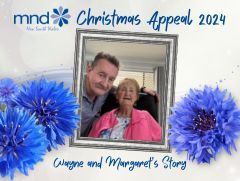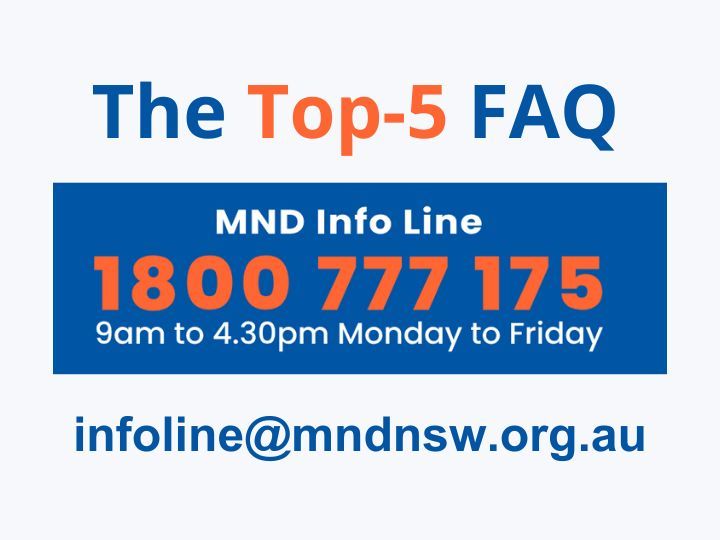In the blink of an eye, Margaret Smith went from a NSW state representative lawn bowler to being confined to a wheelchair and unable to move, speak or eat.
For almost two years she has battled motor neurone disease, and is now completely reliant on the care of her husband, Wayne Smith.
“Margaret started with a cold and a sore throat…and then had trouble speaking. She went to different specialists and it all went on from there,” Wayne said.
“With something like cancer they can usually just cut it out – but with MND you can’t stop it, once you got it you can’t get rid of it. Once it starts it just doesn’t stop.”
Within four months of being diagnosed, her health and abilities declined rapidly.
“MND has created all these issues for her. She can’t move, she can’t speak, she can’t eat – she’s now on a PEG feed. She’s even starting to lose her ability to write, and she communicates with a special communication board,” Wayne said.
“She has been to so many neurologists and doctors, but there is nothing they can do for her. It’s just a process of monitoring, things like making sure she has the right amount of food and protein through her PEG, but there is no cure for MND. In Margaret’s situation their support can’t help her improve her life, only maintain it.”
Battling motor neurone disease wasn’t at all something Wayne and Margaret had planned on doing during their retirement. The dreams of holidays abroad, or even within Australia, after a lifetime of work were shattered. They can no longer even travel interstate to see their children and grandchildren.
“We can’t even go for a holiday – where can you go that’s fully set up for someone who is disabled? How will she comfortably get on and off a plane when she needs to be in an electric wheelchair?,” Wayne said.
“While many people can still go on holidays with a wheelchair, they usually still have some body strength – but because of MND, Margaret can’t do anything for herself. She knows how to do it, but her body just won’t let her anymore,” he said.“Even to go out in the car, I need to manually put her in the car then transfer to an electric wheelchair. And we can’t drive far as you need to make stops, like to go to the toilet, but that means using special disabled toilet facilities which can be hard to find in some areas.”
“We still do what we can, but can’t do much. We would love to go on a holiday but we can’t. That’s the hardest, you don’t have a life now. MND just changes your whole life – we don’t get to socialise like we used to - we just stay home, with the same routine day in, day out. It's a frustrating disease and a frustrating time for us.”
As a carer, Wayne finds watching Margaret deal with the effects of MND a source of worry for him too.
“There are so many things we’d both like to do, but now we just haven’t got time,” Wayne said.
“Margaret needs 24/7 care, so you’re lucky if you have a chance to go out and hang your washing on the line. And even if that only takes ten minutes you’re worrying if she’ll be ok – she needs help to clear her saliva, so is she there choking? That is the kind of pressure on a carer, on someone with a partner who is living with MND.”
And while the physical aspects of motor neurone disease are devastatingly debilitating, especially for people who were previously very active like Margaret and her husband and carer Wayne, there are also financial challenges that come with an MND diagnosis.“As a pensioner, all your money goes on the food and general medical expenses, you have nothing for extras. We don’t own anything, so it’s a struggle financially. Living on a pension doesn’t give you the money you need to cover the expenses and supports you need for a health condition like MND – a single specialist visit can cost $600,” Wayne said.

"Margaret’s MND Advisor Marnie has been helping me immensely. "
Click here to donate to the 2024 Christmas Appeal
Without the assistance of MND NSW, Wayne said he ‘wouldn’t know what they would have done’.
“Margaret’s MND Advisor Marnie has been helping me immensely,” Wayne said.
“Marnie organised the Central Coast allied health team here to assist Margaret– including an OT, physio, and dietician. She put everyone together for us which made everything so much easier – then they just came out one after the other to assist.”
Margaret has been approved for a My Aged Care package, but as it is a Level 4 package it means she will lose the publicly-funded team of health professionals they have been working with so closely to maintain Margaret’s quality of life whilst facing MND.
“We’re grateful for the care package we get – saves a lot of money. It's great to have it, but there’s never enough, especially for a condition like this,” Wayne said.
“Just within the last two weeks Margaret has lost her speech therapist and OT, and now because of the care package we’ll have to get private ones – it’s frustrating, they have been working with her the whole time so it feels like starting from scratch again.”
“And while PEG feed is supplemented, you are expected to still have to buy any equipment you need out of the package, but you just don’t have the money left over. So I save money where I can, but it’s a struggle and it’s not that easy.”
Margaret has received some assistive equipment from FlexEquip, the MND NSW equipment service, and they have plans to attend upcoming support group sessions hosted by MND NSW in their area – assistance that is available because of the generous donations MND NSW receives from our supporters.
“I had cancer, but MND – well, we knew nothing about it, so once Margaret was diagnosed with it, we had to find out what we do, who could assist us – that’s where MND NSW came in and helped,” Wayne said.
“I couldn’t have done it without them. We were just so lucky.”
Not only has Wayne seen the disparity in knowledge and awareness between the cancer he faced and MND that has now affected his wife Margaret, but found there is a great divide in funding and support too.
“Everyone promotes cancer, but there’s other things like this situation – they need money too. In Margaret’s situation you need more support than what’s out there, and the only way you get that is through funding,” Wayne said.
“A lot of people don’t understand MND, and by the time they do, it’s too late. The disease affects people in so many different ways, but usually people haven’t heard of MND until they have a family member who experiences it.”
“MND NSW definitely needs more support and people getting behind it to raise funds so they can assist people living with motor neurone disease.”
Wayne and Margaret have shared their story as part of the 2024 MND NSW Christmas Appeal. To help us be there for people living with MND and their carers, like Margaret and Wayne, click here to donate now.




